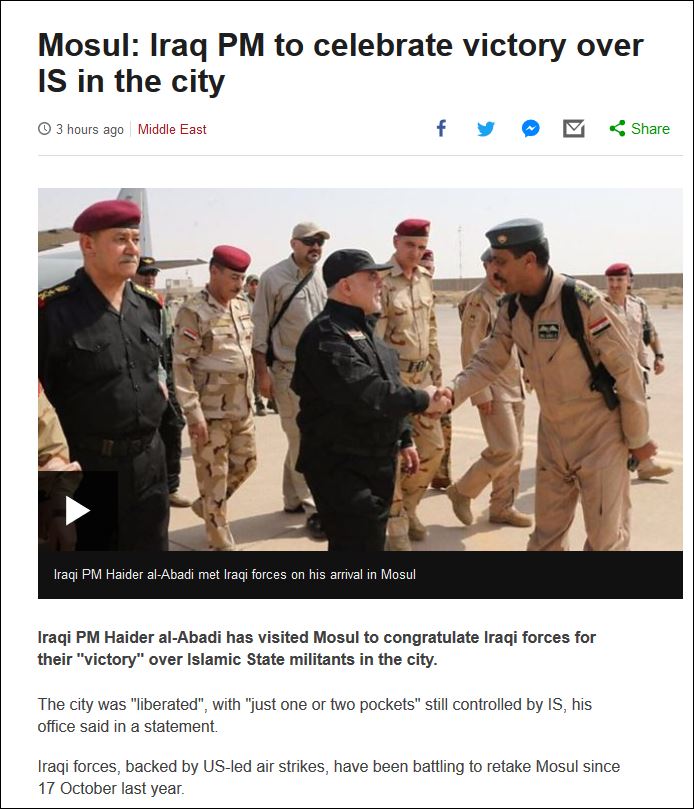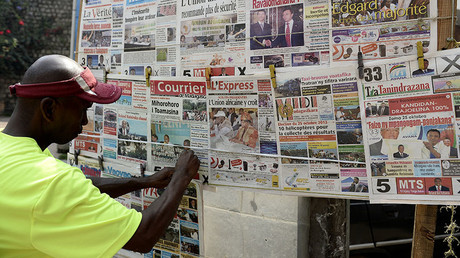Aleppo & Mosul: A tale of two liberated cities
Neil Clark is a journalist, writer, broadcaster and blogger. He has written for many newspapers and magazines in the UK and other countries including The Guardian, Morning Star, Daily and Sunday Express, Mail on Sunday, Daily Mail, Daily Telegraph, New Statesman, The Spectator, The Week, and The American Conservative. He is a regular pundit on RT and has also appeared on BBC TV and radio, Sky News, Press TV and the Voice of Russia. He is the co-founder of the Campaign For Public Ownership @PublicOwnership. His award winning blog can be found at www.neilclark66.blogspot.com. He tweets on politics and world affairs @NeilClark66

The Iraqi city of Mosul. The Syrian city of Aleppo. Both 'liberated' in recent months from radical jihadist terror groups. But while one anti-terrorist operation has been lauded in the West, the other was fiercely denounced.
The very different ways in which the respective 'liberations' were portrayed tells us much about the way war propaganda works in the so-called free world.
For the last few days we've been fed triumphant reports on western news media about the 'liberation' of Mosul from ISIS. US President Donald Trump issued a White House Statement congratulating the Iraqi authorities in which the words ‘liberation’ or ‘liberated’ appeared three times.
Everyone, it seems, wants to get credit for the successful military operation. The Independent newspaper reported how a Pentagon official said that ISIS had been defeated because of Barack Obama's "training strategies." The liberation of Mosul has been sold to us as a great victory. Which, at face value, it undoubtedly is. Who, after all, would like to see the brutal terrorizing butchers of the Islamic State retain territory? But what’s noticeable is how the cost of ‘liberation’ has been glossed over, even though it has been very high indeed.
Airwars researchers, for instance, estimate that between 900 and 1,200 civilians have been killed by US-led coalition and artillery strikes during the eight-month operation, and that "many hundreds of even thousands more may have died in coalition actions."
Airwars quotes International Red Cross spokesperson Iolanda Jaquemet, who said of the mass civilian casualties: “They come with shrapnel wounds, bleeding even from their eyes, shot in the head, after being buried under the rubble, traumatized by the air strikes, the artillery, the snipers, the bombs, having lost their whole family – and too often, dying on arrival.”
In addition, there’s been the destruction of Mosul’s infrastructure. Around 80 percent of West Mosul has been destroyed. The UN says that more than 5,000 buildings in Mosul have been damaged, and 490 destroyed in the historic Old Town. Mosul may have been ‘saved,' but the cost of rebuilding the city will be enormous. That old line from the Vietnam War that ‘it became necessary to destroy the town to save it’ springs readily to mind.
Yet, President Trump mentioned none of this in his White House Statement. Media reports too have tended to downplay the negatives.
How very different to Aleppo in 2016! Then, the anti-terrorist operation of the Syrian army and Russia, to free the east of the city from al-Qaeda/al-Nusra front control, was roundly condemned. The Mayor of Aleppo told Sky News that a "holocaust" was taking place and blamed the international community for doing nothing. Sky News ran special all-day coverage on 14th October, entitled ‘Aleppo, Death of a City’.
In the House of Commons, Foreign Secretary Boris Johnson broke with diplomatic protocol to call for protests outside the Russian Embassy. The lights of the Eiffel Tower were even turned off in a "gesture of support for the people under bombardment in Aleppo."
Prominent media coverage was given to unverified reports from anti-government activists, such as the so-called 'White Helmets,' that Syrian and Russian forces had targeted civilians. The tweets of an anti-Assad, anti-Putin seven-year-old girl caught up in the battle, Bana Alabed, were publicized by leading western celebrities, such as the Harry Potter author J.K. Rowling, who was tweeted by Bana's mother.
"What is happening in Aleppo is a modern-day Guernica,"declared Peter Tatchell, who interrupted a speech by Labour leader Jeremy Corbyn to demand a response. In an emergency Parliamentary debate in London, ashen-faced MPs, who just a year earlier had voted in favor of bombing Syria, lined up to denounce the Syrian authorities and Russia, for, er, bombing Syria. Tory Tom Tugendhat called for a no-fly zone over Aleppo to be imposed. "The helicopters that are dropping barrel bombs could easily be brought down by rockets based in Turkey or Lebanon, or, indeed, by our own type 45s in the Mediterranean," he said.
Fellow Conservative Andrew Mitchell compared Russia’s actions to those of the Nazis: "The Russians are not attacking military formations. They are attacking hospitals and a terrified population."
Pro-war Labour MP John Woodcock concurred with Mitchell. "His comparison with the actions of the Nazi regime and the League of Nations is very powerful," he said. Woodcock lamented that "no-one is standing up to the Russian regimes bombs" and concluded with a rallying call to arms: "Are we going to be a latter-day generation of Neville Chamberlains, or are we going to take courage and act in the manner of the great Winston Churchill?"
In such a climate of warmongering hysteria, those who referred to the 'liberation' of Aleppo, like the plucky, Neo-Con-Thought-Police-defying Morning Star newspaper, were rounded on in true McCarthyite style by 'liberal interventionists' and Establishment gatekeepers.
"Eastern Aleppo being recaptured by the brutal regime of Bashar al-Assad is not 'liberation'. The left must not pretend it is,"proclaimed the New Statesman's Media Mole.
"If you associate with this traitorous scum after this front page you've no place in our politics," tweeted a furious John Woodcock.
In fact, contrary to the ‘Something Must Be Done’ elite propaganda, the recapturing of eastern Aleppo from fanatical child-beheading terrorists was indeed a liberation. The ‘holocaust’ we were warned about 24/7 did not happen. On the contrary, there were scenes of unbridled joy when the whole city was brought back under government control. For the first time in five years Christians could attend Christmas Mass in the old city's St Elias Cathedral. Western neocons would, of course, have preferred it if the jihadists had stayed on.
Since December, citizens in Aleppo have been slowly getting their lives back to normal. Thousands have returned to their homes. In fact, the UNHCR reports that almost 500,000 Syrians have gone back to their homes in 2017, returning to areas that are under government control or recaptured from anti-government ‘rebels’.
Needless to say, that won‘t be promoted in pro-regime-change media because it doesn't fit with the dominant narrative of Syrians fleeing their government.
How long, I wonder, will it to take for life to get back to anything like normal in Mosul, or Raqqa? The battle for Aleppo was portrayed very differently because the 'official enemy' was doing the liberating.
Official enemies - whether it’s the Syrians or Russians, Libyan government forces in 2011, or the Yugoslav Army in 1999 - can never be seen fighting terrorism, or liberating cities/areas in their country from terrorist control. Whenever 'they' act, its ALWAYS described as a 'genocide' or holocaust'. They deliberately target civilians and bomb hospitals for fun.
However, whenever western 'approved' sides kill civilians - whether they are part of a US-led coalition Israeli forces bombing Gaza or Saudis pounding Yemen - it's all justified. Such casualties are 'collateral damage' and/or 'mistakes'. Or, of course, blamed on the 'bad guys' for using 'human shields'. It’s interesting, too, that there’s no equivalent to the White Helmets in Mosul to report on civilians killed by Coalition bombs.
Those who were so outraged by civilian deaths during the military operation to recapture Aleppo don’t seem too concerned about them in Iraq. There’s been no emergency debate in the House of Commons to discuss the death and destruction in Mosul. The Eiffel Tower hasn’t dimmed its lights "in a gesture of support for the people under bombardment." Boris Johnson hasn’t called for any protests. And, to the best of my knowledge, the author of Harry Potter hasn’t been tweeting about children caught up in the "liberation" there as she did so regularly during the "siege" of Aleppo.
The latest news is that Bana Alabed is to publish a memoir of her time in Aleppo, to be published by Simon and Schuster, a part of the CBS Corporation, in the US this autumn. The publishing giant acquiredthe rights to the book from the Blair Partnership, the agent of J.K. Rowling. No doubt a lucrative Hollywood film offer will soon follow.
I think we can safely say that the odds of a big western publishing house giving a contract to an 'anti-liberation' seven-year-old Mosul inhabitant, and the resulting book later being made into a Hollywood film, are at least 10,000-1.
Follow Neil Clark on Twitter @NeilClark66
The statements, views and opinions expressed in this column are solely those of the author and do not necessarily represent those of RT.





0 Comments:
Post a Comment
Subscribe to Post Comments [Atom]
<< Home